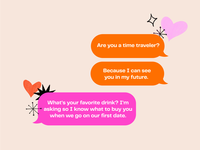Experts Share Tips on Overcoming the Fear Of Rejection in Love

Just about everything in life carries a level of risk and dating isn't exempt. Some less-than-optimal outcomes of dating can include rejection and heartbreak; both can make you want to disappear into a dark abyss. Some people have opted out of dating because their fear of rejection overpowers their desire to find love. While riding into the sunset with "the one" isn't the only way to live a fulfilling life, the fear of being rejected shouldn't be the reason you don't find love if it's something you truly want.
What is a fear of rejection anyway? Where does it stem from and how is it an impediment to you finding your person? Takira Victorin, an individual and couples therapist in Brooklyn, New York and Jenifer Smith, a sex therapist in Alexandria, Virginia, answer these questions and more.
In this article:
- What is a Fear of Rejection?
- How a Fear of Rejection Can Impact Dating
- How to Overcome a Fear of Rejection
What is a Fear of Rejection?
If you're reading this article, you've probably experienced rejection at some point in your life, be it by a family member, friend, stranger or lover. "Fear of rejection is an emotional and psychological concern where an individual experiences anxiety or distress about the possibility of being rejected or not accepted by others," Victorin explains.
By definition, we can see that the fear of rejection is often based on something that hasn't happened yet and can be magnified by stories we create in our heads. Likely, the fear stems from past experiences of rejection that still live rent-free in our heads and consciously or subconsciously create stories about what might happen in the future (like being paranoid about cheating).
It's important to remember that the fear of rejection in love may be rooted in life experiences outside of a past romantic prospect or partner rejecting you. Past negative experiences, low self-esteem and insecure attachment styles are a few according to Victorin.
"Childhood experiences, such as having critical or emotionally unavailable caregivers, can also make a person more sensitive to rejection," she says. "Insecure attachment patterns and perfectionism can further intensify this fear, as individuals may feel they are not 'good enough' for others. Societal and cultural pressures around success, beauty or status can also contribute to the fear of not being accepted. These factors often create a deep sense of vulnerability, making it difficult to take risks in relationships, careers or social situations due to the potential for rejection."
For anyone unfamiliar with attachment style theory, it focuses on relationships and bonds and the central role caregivers play in fostering emotional safety and security during the incipient stages of a child's life. Individuals without a secure attachment style may struggle more with rejection, so it's worth understanding how this may impact you.
How a Fear of Rejection Can Impact Dating
If you're afraid of being rejected, someone unexpectedly unmatching you on a dating app, ghosting you or sharing that they're no longer interested can be debilitating. It can also lead to you internalizing the rejection or not trying to date at all.
That said, understanding how your fear of rejection impacts you is key, Smith says. "Rejection can impact your dating life if you're not conscious of how rejection has impacted you," she says. Additionally, it can impact the quality of your relationship if you do get into one. "If you have a history of being rejected it can inherently create the fear of being abandoned in a relationship," Smith adds.
The fear of rejection can also lead to one making assumptions about how a prospect will behave, jumping to conclusions and self-sabotaging. "I encourage people to be conscious of projecting their fear of being rejected or abandoned onto others," Smith says. "If you find doing this difficult then it may be necessary to take a pause on dating until you can work through your feelings."
How to Overcome a Fear of Rejection
It is human to have fears around rejection but they don't have to get in the way of you finding the one. To get over a fear of rejection in relationships and feel ready to date again, it's critical that you take steps to understand the root of those fears and heal any unresolved trauma you may be harboring. Here are some practical tips Victorin provides to help with that process.
Identify and Challenge Negative Thoughts
Reality testing is one way to conquer the fear of rejection, Victorin says. Reality testing is a concept devised by Sigmund Freud that therapists use to distinguish between fears and reality. "Reflect on the thoughts that contribute to your fear of rejection. Challenge these beliefs by asking yourself if they are based on evidence or assumptions," Victorin says. "By recognizing and challenging these thoughts, you can positively reframe the situation and reduce anxiety around rejection."
Build Self-Confidence and Practice Vulnerability
Sometimes we are afraid of being rejected because we think it will affirm negative beliefs we already hold about ourselves. For example, if you have insecurities around your physical appearance and a prospect chooses not to proceed with a second date, you may assume it's because you're truly unattractive. "Developing a strong sense of self-worth helps reduce the impact of potential rejection. Focus on your strengths, accomplishments and positive qualities, and remind yourself that rejection does not define your overall value or worth as a person," Victorin says.
She also adds that you can take practical steps like initiating conversations or expressing your opinions to build self-confidence in dating. The goal here is to put yourself in situations where rejection may occur and practice navigating it. On the contrary, these experiences may also not result in rejection. "As you experience moments where rejection doesn't happen—or where you handle it well—you'll become more comfortable taking larger risks, improving your resilience over time," she says.
Develop Coping Strategies
Since rejection of some sort is inevitable, it's important to learn how to cope with it. Some common coping strategies may include therapy, journaling and affirmations to remind yourself about who you are and boost your self-worth. "The truth is, not every interaction will lead to acceptance. Understand that rejection is a normal part of relationships and dating and it doesn't diminish your worth as a person," Victorin says























